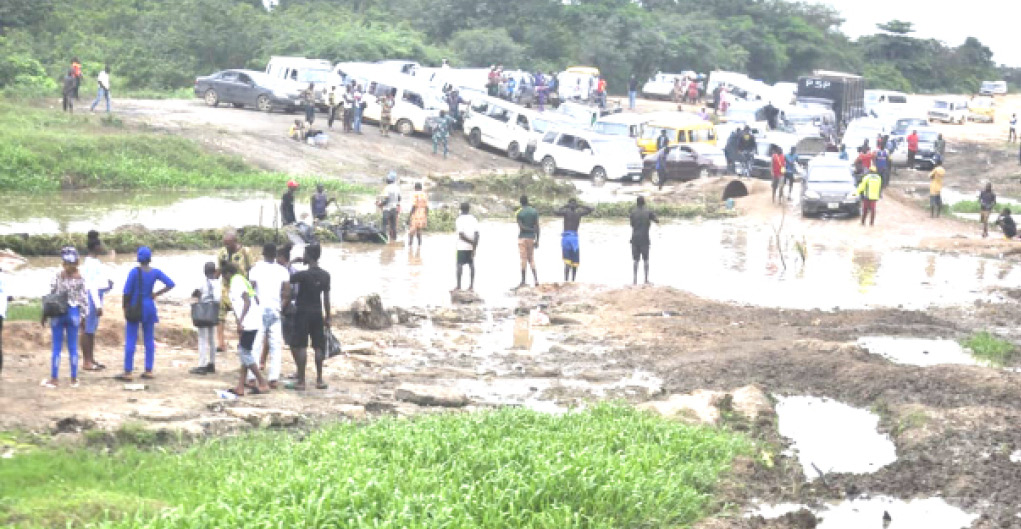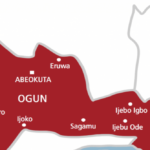The set target for the completion of the Lagos-Ibadan expressway is December 2022. In a bid to meet the target, the usual four-lane road has been narrowed down to two. In this Daily Trust Saturday report, motorists and travelers recall their horrific gridlock traffic experiences.
For motorists and commuters plying the ever-busy Lagos-Ibadan expressway, it has been hellish in recent times owing to what they called “mad traffic gridlock.”
- Meet 18-year-old water-powered rocket inventor
- Govt begins operation zero potholes, list 11 major roads for intervention
Since the narrowing of the expressway in June as part of the rehabilitation work, it has been a tale of woes for motorists and pedestrians, especially those going outwards Lagos.
The Federal Ministry of Works had announced that the diversion would only last for six months.
The federal government, through the ministry, set a target of December 2022 for the completion of the 127.6-kilometre-long road project being handled by Julius Berger and the RCC.
While Julius Berger is handling the Lagos-Shagamu axis, the RCC is in charge of the Shagamu-Ibadan section of the expressway.
The road is one of the critical highways in Nigeria, being the major connecting route for the country’s seaport to the hinterlands. Thousands of cargoes and petroleum trucks, as well as passenger vehicles, ply this route daily.
While there has been an improvement in the construction works, the Lagos axis, which is about the busiest, is causing untold hardship for motorists and pedestrians. This, according to stakeholders, was largely due to the volume of vehicles going in and out of Lagos.
At the moment, a four-lane road has been narrowed to accommodate just about two vehicles, thereby causing inconvenience to motorists. Those working in Lagos and living around Mowe, Ibafo, Arepo, Magboro, among others, are not finding it funny going to work on a daily basis.
“The ongoing construction on the Lagos-Ibadan expressway, especially from the long bridge, Kara, Berger axis, has made life unbearable for commuters plying the ever-busy road,” a civil servant who spoke with Daily Trust Saturday said.

He said the contractor handling the work must as a matter of urgency speed up the pace of work to ameliorate the suffering of people plying the road.
He said, “A supposed 20-minute trip from Mowe to Berger is now taking over 4 hours and this is largely due to the shoddy work by Julius Berger, who need to, as a matter of urgency, speed up the process.
“Also, their usual movement from one spot before completion to another isn’t good enough because it doesn’t allow commuters to plan their movement on that route. They didn’t complete the work at the Otedola corridor before starting that of OPIC, Kara, inward Lagos, and this has become their practice over time.
“If we are to go by the situation of things on that road in the last two weeks, it won’t be out of place to believe that the six-month target for the completion is not visible, and that is why it is imperative that they peak up the pace and try to work on the loopholes that are affecting a smooth construction.”
A visit to the expressway along Kara/long bridge axis during the week showed a chaotic situation, with motorists virtually stuck in one spot for hours. They said some bad portions of the expressway with ditches and potholes had worsened the situation.
Also, many motorists had to resort to the alternative roads along the bush paths, which however, exacerbated the situation as it rained on the fateful day. Several vehicles, including commercial yellow buses, were trapped in the accompanied flood along the alternative roads.
Some passengers were seen disembarking from a vehicle that was stuck in the mud and crossing to the other side to wait. Some of the females among them had to trek very close to the dry area of the long bridge, from where they trekked to the main road to board another vehicle to their destinations.
“The situation here is very terrible. I don’t know what Julius Berger or the federal government is doing on this road. People are suffering. I have been using this road for many years but the traffic has never been this bad. I think the government needs to fast-track the work,” another motorist identified as Mr Shittu, who was entering Lagos from Ibadan, said.
Another commercial vehicle driver who was reluctant to talk to our correspondent because he was angry at the situation said, “Just last week, somebody died on this road. The holdup is too much for us. This is what we have been experiencing for the past few weeks.”
Our correspondent also observed that for pedestrians entering Lagos, it has been a fortune for commercial motorcyclists, popularly known as okada riders. They charge between N500 and N3,000 from passengers entering Lagos. In between the chaotic gridlock, the okada riders are always seen navigating their way and going through the wrong lane.
Another passenger said, “Okada riders are the only people making money here. From the long bridge, where you can see Berger bus stop, they insist you pay N500, and they would still carry two passengers. They go as far as Shagamu interchange and Mowe to carry passengers.”
Another motorist, Suraju said, “The alternative way we can take here is a no-go area as you can see that many vehicles have already broken down there.
“The area boys are not helping matters as well. If you do not part with money they will not assist you, especially when your car breaks down. At times,they pretend to help but indulge in pulling the vehicle backwards. To assist in pushing vehicles out of the mud they charge between N500 and N1,000.”
Our correspondent observed that workers of Julius Berger are digging deep into the soil around the construction area.
One of the workers on site who spoke with our correspondent on the condition of anonymity because he was not authorised to speak to the media said, “The road construction is remaining just one kilometre maximum to complete this axis. If it does not rain, the remaining part of the road is supposed to be completed in a week.”
Chaotic traffic management
For the Federal Road Safety Corps (FRSC), maintaining orderliness among motorists on the road is a tough challenge.
The Lagos sector commander of the FRSC, Olusegun Ogungbemide, told Daily Trust Saturday that the command had always mobilised its men to the expressway early in the morning but said the volume of traffic had not reduced.
He said, “As early as one can think of, we have our men deployed there; and we try as much as we can to do prompt removal of obstructions. If I have to categorise the reason behind the heavy gridlock we are witnessing, you would agree with me that even when the road was totally free, there used to be heavy movement of traffic in and out of Lagos.
“One thing we should all appreciate is that traffic volume in Lagos is extremely heavy, and even then, any little obstruction creates a lot of backlog we have to battle with, even after the obstruction has been removed, that’s basically due to the heavy traffic in Lagos.
“Now, we have a situation where an already heavily burdened road is being narrowed down for expansion. So, we have people coming from four lanes being reduced to two on the long bridge, and you know the effect. In the midst of this you still have problems with vehicles breaking down and creating obstructions, which at times take some time to remove. There’s also the issue of impatient drivers going against the traffic, which eventually would lead to total blockade.”
He appealed to motorists to exercise patience as they have to bear with the little inconvenience to allow for the completion of the expressway.
“It is a reality we still have to face. What we have to contend with is the technicality involved in the process. But is the construction process in order? Is there a better way of approaching it? These are the questions we ask. We also have a series of meetings with them for the traffic management plan. And the construction company will also have their own information. They have a mandate on the time they have to get the job done so that it would be well made ready for the use of Nigerians.
“You would recall that it was hell moving from Lagos to Ibadan a few months back, but today, when you are off the long bridge, under 45 minutes you are in Ibadan. It is very painful, and it is more painful because the point of construction is long and that’s the major problem we are having. The length is longer and the stress of going through this long length is what we are all battling with,” he said.

 Join Daily Trust WhatsApp Community For Quick Access To News and Happenings Around You.
Join Daily Trust WhatsApp Community For Quick Access To News and Happenings Around You.


